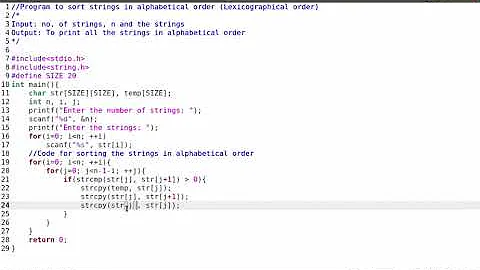Sort a string in lexicographic order python
Solution 1
Do not use lambda functions when there's builtin ones for the job. Also never use the cmp argument of sorted because it's deprecated:
sorted(s, key=str.lower)
or
sorted(s, key=str.upper)
But that may not keep 'A' and 'a' in order, so:
sorted(sorted(s), key=str.upper)
that will and, by the nature of sorted the operation will be very fast for almost sorted lists (the second sorted).
Solution 2
You could use a 2-tuple for the key:
text='aAaBbcCdE'
sorted(text, key=lambda x: (str.lower(x), x))
# ['A', 'a', 'a', 'B', 'b', 'C', 'c', 'd', 'E']
The first element in the tuple, str.lower(x) is the primary key (making a come before B), while x itself breaks ties (making A come before a).
Solution 3
cmp was the old way of doing this, now deprecated, but for posterity:
s='aAaBbcCdE'
sorted(s, lambda x,y: cmp(x.lower(), y.lower()) or cmp(x,y))
Solution 4
data = input()
data=list(data)
data.sort()
Now the variable "data" will have lexicographically sorte`d input provided.
Related videos on Youtube
Bipul Jain
Python , Django, Web, Search and Data. I design and develop for web applications and backend development. Interested in short-term and mid-term projects.
Updated on July 27, 2021Comments
-
 Bipul Jain almost 3 years
Bipul Jain almost 3 yearsI want to sort a string to a list in lexicographic order as
str='aAaBbcCdE'to
['A','a','a','B','b','C','c','d','E']but
sorted()gives me this output:['A','B','C','E','a','a','b','c','d']How can I sort lexicographically?
-
JBernardo over 12 yearsthat's deprecated use of sorted.
-
 Russia Must Remove Putin about 9 years@KarolyHorvath to be completely obvious, fix your answer and he won't have to.
Russia Must Remove Putin about 9 years@KarolyHorvath to be completely obvious, fix your answer and he won't have to. -
Karoly Horvath about 9 years@AaronHall: which will make the comments misleading. no, thanks.
-
 Antti Haapala -- Слава Україні about 9 yearsActually, let's keep this answer here :D
Antti Haapala -- Слава Україні about 9 yearsActually, let's keep this answer here :D -
Abhijeet over 5 years
sorted(sorted(s), key=str.upper)stands-out. -
Scott Gartner almost 3 yearsThis solved it for me, but I don't understand why returning x doesn't result in correct sorting, but returning (lower(x), x) does. Can anyone explain?
-
 Raffi over 2 years@ScottGartner returning a 2-uple
Raffi over 2 years@ScottGartner returning a 2-uple(lower(x), x)basically uses the already implemented lexicographical ordering of the tuples: all elements that are equal on the index 0 of the tuple will be sorted by the element of the index 1 of the tuple, all elements that are different on index 0 will be sorted as usual. -
 Raffi over 2 yearsThis is the best answer by far!
Raffi over 2 yearsThis is the best answer by far!






